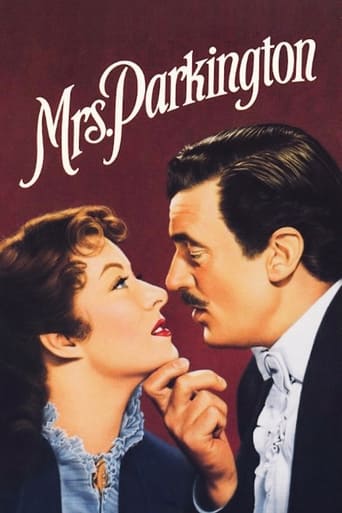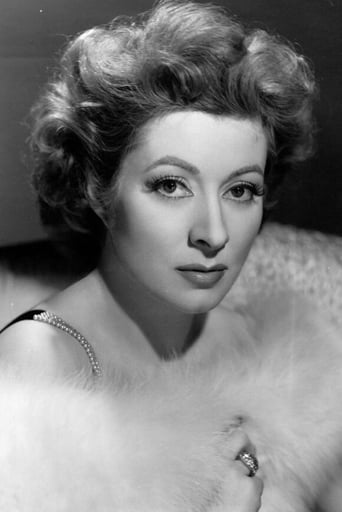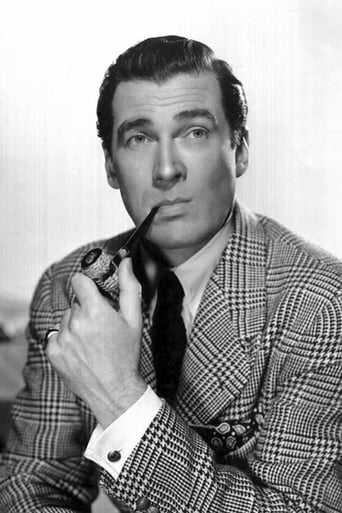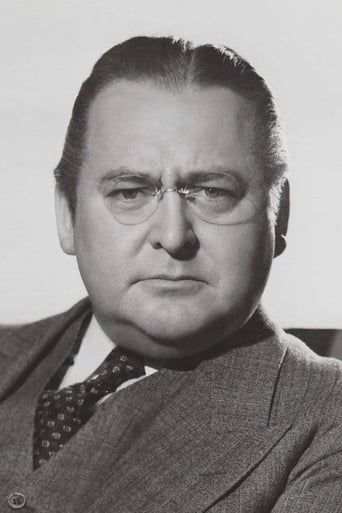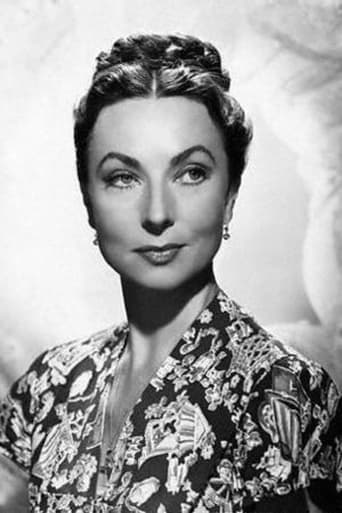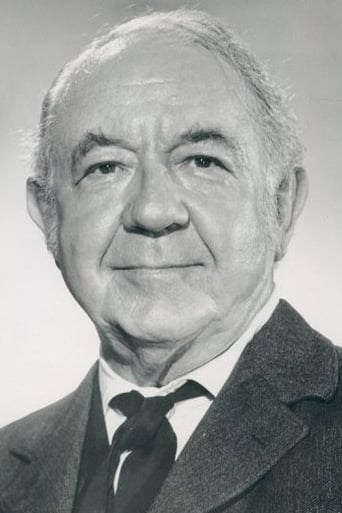jacobs-greenwood
Directed by Tay Garnett, the screenplay for this Louis Bromfield novel was written by Robert Thoeren and Polly James to create a romance which plays out over 65 years, mostly in flashback. The drama itself is average, but some of the acting is exceptional including Greer Garson in the title role and Agnes Moorehead as Aspasia Conti; both performances were Oscar nominated. Although there are several other familiar actors and actresses in supporting roles, the film's story revolves around Major August 'Gus' Parkington (Walter Pidgeon) and the simple boarding house maid, girl, he married.The Major's a bit of a scoundrel, certainly an independent and a risk taker, the kind of man who helped build this great country, who is somewhat tamed by Susie, whom he dubs his 'Sparrow', as their relationship evolves. Garson, whose character is an 84 year old widow dealing with the problems of her children, their spouses, and her grandchildren when the film opens, is the only actress who appears throughout the story, though Moorehead and Pidgeon play a close second. Edward Arnold, Gladys Cooper, Frances Rafferty, Tom Drake, Dan Duryea, and Lee Patrick (among others) are Parkington family members who appear in the present day (Christmas, 1938) scenes as does Selena Royale, who also appears in some "earlier" scenes as Mrs. Parkington's longtime maid. Cecil Kellaway, Peter Lawford (though he is just window dressing), Tala Birell, Hugh Marlowe and Fortunio Bonanova, as a hired tenor with Hans Conreid as his manager, appear (among others) in discrete flashback scenes.The present day drama is two fold, granddaughter Jane (Rafferty) wants to marry Ned Talbot (Drake) who knows about her father Amory's (Arnold) embezzlement and pending exposure for such, and serves only to provide Mrs. Parkington with opportunities to privately reminisce about her life with her husband. With the exception of the risk taking Amory, the other Parkington heirs have grown fat and lazy living off of the departed Major's largess - this is epitomized by (the typecast?) Duryea, who plays Arnold's son. Cooper, Patrick and the rest of the family (which also includes Helen Freeman as Arnold's wife and Rod Cameron as Patrick's fourth husband) are given little to do besides feign outrage and fill scenes. Byron Foulger appears (uncredited) as a befuddled genealogist. This part of the story is of little interest, providing only clichés. The love story, a triangle of sorts, provides the film its only compelling moments:The Major owned a mine in some drink water town, named Leaping Rock, out West (in 1873 or thereabouts). His only concern was how fast he could the silver out of it, so he paid the workers (Harry Cording etc.) double so that they'd work it instead of worry about their safety. Susie did the cleaning in the local boarding house, which her mother (Mary Servoss) owned. She's naturally excited to meet the worldly Major when he comes to town to check on his investment; he is smitten with her beauty. However, she will not give in to his charms and become another of his conquests. When the mine inevitably collapses, Susie's mother is killed because she was filling in for her daughter, taking lunch to the men. The Major leaves her no choice but to accept his proposal and the next thing you know they're married, living and staying in the Royal Hotel in New York. But, what do you know, the Major had been practically engaged to a French Baroness, also living in New York, named Aspasia Conti (Moorehead), before he'd gone out to Leaping Rock. So, the first thing he does upon his return, after apologizing to Aspasia, is ask her to help Susie become presentable to all his friends in New York! The Major's new wife is not initially (ever?) accepted, which in a perverse way leads to a miscarriage of their first child followed by the Major's revenge upon those to whom he assigns blame. Evidently, the Major is so much smarter than all the other men on Wall Street that he's able to cause bankruptcies and suicides among his rivals at will. Marlowe, playing a lawyer, and Alma Kruger (uncredited), as one of the wronged's wives, appear briefly as persons who educates Susie about her husband's dealings.Susie's and Aspasia's relationship grows as does Susie's with the Major, though she appears to have the upper hand as she's able to wait him out through various disagreements until he breaks down and/or gives in to her (my wife must have seen this movie before we were married). The couple loses another of their children which causes a separation; he goes to England while she cries for a year. Aspasia alludes to the Major's relationship with a certain household hostess he'd hired, which causes Susie to breakout of her funk and travel abroad. There, she meets her "competition" in Birell's character after she'd mistaken Edward (Kellaway), the Prince of Wales, for a gatecrasher. Edward helps Susie to manipulate the situation in her favor once again. Lawford plays a Lord with no lines.The film's best dialogue, spoken between Garson's and Birell's characters, is a rather catty one. The movie ends by wrapping up the present day situation, or not.
lyricook-1
In spite of the top notch acting by the entire cast, I think this film should have been relegated to a typical country song of woe with a woman moaning about her chosen life to a sympathetic guitar. It is not because I viewed it from our current perspective; I don't think the attitudes portrayed were necessarily universal even in that era. My own parents, born in 1892 and wed in 1914, were partners in their marriage, as were most of their friends. Even though women took care of the home and children and men were the breadwinners, in all decisions and routines both husbands and wives were equal participants. At least there was a brief hint that women were sexual beings also, or maybe that was Garson's normal sparkle.
edwagreen
With her son-in-law about to go to prison for fraud, the wealthy Parkington family faces financial ruin. Made up as an 84 year old woman, Greer Garson thinks back to her life with her husband, Col. Parkington, a wonderful Walter Pidgeon.It goes back to her humble beginnings and her meeting with the colonel.The film proves that money isn't everything as we see the ups and downs of the Parkington marriage, constantly beset by tragedies.Garson was nominated for best actress here and Agnes Moorehead, with a totally French accent, snared a best supporting actress bid as her rival turned friend.Gladys Cooper plays Parkington's daughter, a divorcée with a drinking problem. As is the case with the rest of the brood, she is selfish, self-centered and afraid of poverty. Obviously, the Parkington ways did not descend on children and grandchildren.The picture has an all-star cast. Cecil Kellaway stands out as the Prince of Wales, son of Queen Victoria.Garson shows her mettle here. She is a stalwart in every sense of the word.
vincentlynch-moonoi
Greer Garson and Walter Pidgeon turn in fine performances here, in fact, they're as good here as in any of their films. Garson has long been a favorite of mine, and I particularly revere her performance in "Random Harvest". This film isn't quite that good, but it is a gem.Of particular interest here are two very unusual performances by supporting actors. When I read, in advance, that Agnes Moorehead played a French socialite...well, I just couldn't see it. But, she was wonderful, and this is an Agnes Moorehead you've never seen before! And Cecil Kellaway as Edward, Prince of Wales...again, a very different performance, and so well done.The story itself is interesting, with Garson as an old family institution reflecting on her life. If there's a criticism about this film, it's that Garson looks too young even in her elderly makeup. But, for much of the movie, she's her usual alluring self. Is it a sentimental melodrama? Yes. But a delightful one.
